Trending Now
We have updated our Privacy Policy and Terms of Use for Eurasia Group and its affiliates, including GZERO Media, to clarify the types of data we collect, how we collect it, how we use data and with whom we share data. By using our website you consent to our Terms and Conditions and Privacy Policy, including the transfer of your personal data to the United States from your country of residence, and our use of cookies described in our Cookie Policy.
{{ subpage.title }}
Bjorn Lomborg wants to redefine climate change's impact on our lives and economy
Climate change is an urgent problem, but it can be helpful to think about it in the long term because it’s a problem that will be inherited by generations to come.
On GZERO World, Ian Bremmer challenges controversial climate author Bjorn Lomborg on whether his perspective on climate would be different if he were going to live for 200 years instead of the typical 85. But Lomborg holds fast in his belief that though climate change will affect the trajectory of human progress, it won’t lead to the most dire predictions forecast by climate scientists. Instead of searching for a panacea, Lomborg says the world should focus on policies that address climate change in the most cost-effective and efficient ways.
Bremmer challenges Lomborg to think about the potential loss of coastal areas and homelands from rising sea levels, which would lead to a significant shift in how people perceive the future of the planet. But Lomborg is firm in his belief that straight-line thinking is counterproductive. Lomborg predicts we’ll be able to protect most places with advances in technology and that worst-case climate scenarios won’t come to pass.
Catch GZERO World with Ian Bremmer every week at gzeromedia.com/gzeroworld or on US public television. Check local listings.
- Climate change: are we overreacting? ›
- "Climate is a problem, not the end of the world" - Danish author Bjorn Lomborg ›
- Can the world run on green energy yet? Author Bjorn Lomborg argues that's very far off ›
- Podcast: Challenging the climate change narrative with Bjorn Lomborg ›
- Climate change isn’t the most immediate threat to humanity, argues Niall Ferguson ›
- Fix climate change, don't just adapt to its consequences ›
- What Africa has to say about climate change ›
- Climate change trade wars ›
- How China fits into global climate change ›
Can the world run on green energy yet? Author Bjorn Lomborg argues that's very far off
Renewable energy technology like solar power, wind turbines, and battery storage have made exponential advances in the last decade. But is it enough to address the climate crisis?
On GZERO World, Danish author Bjorn Lomborg sits down with Ian Bremmer to discuss his controversial views on climate change and his belief that current climate technology is nowhere near where it needs to be to move to a net-zero world truly. He acknowledges the price of things like solar panels has gone down, but argues renewable tech is still being propped up by government subsidies.
Scaling up renewable energy technology, even in wealthy countries, is still a huge challenge.
Lomborg says that solar and wind power are intermittent energy sources that can’t provide enough power to keep most places running 24/7. And while prices have come down significantly from where they were a decade ago, the price of lithium-ion batteries needs to be 99% cheaper for them to be a real, practical solution for reliable energy storage.
“We are just far, far away from this actually being something that will scale even in rich countries, and certainly not in poor.”
Watch the full interview on GZERO World: Climate change: are we overreacting?
Catch GZERO World with Ian Bremmer every week at gzeromedia.com/gzeroworld or on US public television. Check local listings.
- Climate change is "wreaking havoc" on supply chains ›
- After Fukushima, can nuclear power actually help save the planet? ›
- Trudeau lays out plan to grow Canada’s clean economy ›
- How Biden's climate bill moves the US towards clean energy ›
- India to unveil massive subsidy scheme to hasten clean energy transition ›
- Solving Europe's energy crisis with Norway's power - GZERO Media ›
"Climate is a problem, not the end of the world" - Danish author Bjorn Lomborg
How far should the world go to stop climate change? On GZERO World with Ian Bremmer, controversial Danish author Bjorn Lomborg discusses his perspective on climate and how it differs from the global climate narrative.
Lomborg acknowledges that global warming is a genuine problem but argues it’s not an apocalyptic threat. This nuance is important, Lomborg says. Because it allows for a more balanced approach to addressing climate, as opposed to an all-encompassing focus on the issue of lowering carbon emissions.
Because most of the world still runs on fossil fuels, he says, the singular focus on net-zero emissions is inefficient and misguided. Instead, Lomborg advocates for a greater emphasis on green innovation as a more practical way to address climate concerns.
Watch the full interview on GZERO World: Climate change: are we overreacting?
Catch GZERO World with Ian Bremmer every week at gzeromedia.com/gzeroworld or on US public television. Check local listings.
Climate change: are we overreacting?
Climate experts agree that climate change is real and human-caused. But how far should the world go to combat it? Will the worst-case scenarios forecast by climate scientists end up a reality?
On GZERO World with Ian Bremmer, author Bjorn Lomborg says the answer is no. Climate change is indeed a problem, he says, but “it’s not the end of the world.”
We're not talking about ‘we need to double or triple [renewable energy capabilities].’ We need a hundred-fold increase,” Lomborg tells Ian Bremmer. “We are far away from this actually being something that will scale even in rich countries and certainly not in poor countries.”
Lomborg worries that policy priorities are out of whack and billions of dollars are being wasted on incremental climate mitigation when there are so many urgent issues, like education or maternal mortality, where that money could be used more effectively.
Catch GZERO World with Ian Bremmer every week at gzeromedia.com/gzeroworld or on US public television. Check local listings.
Podcast: Challenging the climate change narrative with Bjorn Lomborg
Listen: On the GZERO World Podcast, Ian Bremmer sits down with Danish author Bjorn Lomborg, a controversial figure in the world of climate change. Lomborg is unequivocal that climate change is a real problem and that humans are responsible for causing it. But where he differs from the global climate narrative is that the current focus on reducing carbon emissions is misguided and ineffective. Lomborg argues the world is too fixated on stopping climate change at the expense of… everything else.
He worries billions are being spent on incremental climate mitigation when that money could be spent more effectively on things like education or maternal mortality. Bremmer challenges Lomborg on a range of issues, from the exponential advancements in renewable technology to the disproportional impact of climate disasters in poor countries. While the two don’t agree on everything, their conversation affirms that climate change is a complex issue that requires nuanced thinking and effective solutions to avoid worst-case scenarios for future generations.
Subscribe to the GZERO World Podcast on Apple Podcasts, Spotify, Stitcher, or your preferred podcast platform, to receive new episodes as soon as they're published.- Podcast: UN Secretary-General António Guterres explains why peace in Ukraine is his top priority ›
- Podcast: How human history is shaped by disaster, according to Niall Ferguson ›
- Episode 7: Running on fumes: the future of fossil fuels ›
- Podcast: Can we fix the planet the same way we broke it? Elizabeth Kolbert on extreme climate solutions ›
- Why the world isn't fair: Yuval Noah Harari on AI, Ukraine, and Gaza - GZERO Media ›
- "The next 50 years belong to Alaska" — An Interview with Gov. Mike Dunleavy - GZERO Media ›
Fix climate change, don't just adapt to its consequences
Should the world be focusing more on adaptation as an answer to the climate crisis? In a recent Wall Street Journal op-ed, Danish author Bjorn Lomborg argues that countries - and the media - are panicking over climate change instead of concentrating on tactics like levees and floodwalls. Ian Bremmer takes out the Red Pen to explain why these solutions are not enough to protect the planet.
COP26 is in the air (that's the UN Climate Conference still underway in Scotland) so feels like a good time to take our red pen to an op-ed that…isn't very green. It's from the Wall Street Journal and written by Danish author and academic Bjorn Lomborg. The title sums it up: "Climate Change Calls for Adaptation, Not Panic."
A little background on Lomborg: He's a prominent critic of the global consensus on climate change and wrote a book called "False Alarm: How Climate Change Panic Costs Us Trillions, Hurts the Poor, and Fails to Fix the Planet." Let's be clear: his views are controversial, but given his platform and this week's focus on climate policy, it's important to address the substance of his claims. So, let's break out the Red Pen!
First, the core of Lomborg's argument is that countries need to spend more time focused on ways to adapt to climate change, instead of trying to change their economies to reduce its effect. He writes, "Adaptation doesn't make the cost of global warming go away entirely, but it does reduce it dramatically."
Nobody disagrees that adaptation is important (anymore—lots of people did when COP started 27 years ago, because they thought it was tantamount of surrender).
But it's not a comprehensive solution. Take rising temperature, for example. If the air gets too hot, why can't we just use more air conditioning? Well, air conditioning requires more energy, and more energy consumption leads to more emissions. Cleaner and more efficient air conditioning requires technology, industry, finance, and policy. That's a microcosm of the real conversations in Glasgow. This stuff is complicated. It's not just about a single solution.
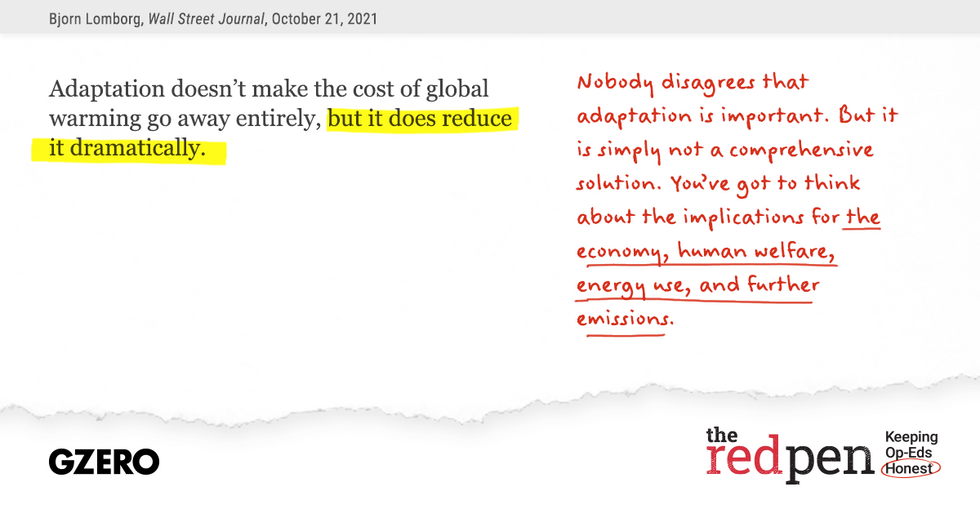
Next, Lomborg suggests that farmers can adapt by shifting production from one place to another, like corn production in North America, which "has shifted away from the Southeast toward the Upper Midwest, where farmers take advantage of longer growing seasons and less-frequent extreme heat."
Moving agricultural production like this works only in big, relatively empty, and fertile countries like the US and Canada. It does not work in highly populated, smaller countries across South and Southeast Asia or Africa, already suffering from shortages of fresh water and arable land. Adaptation alone will not suffice.
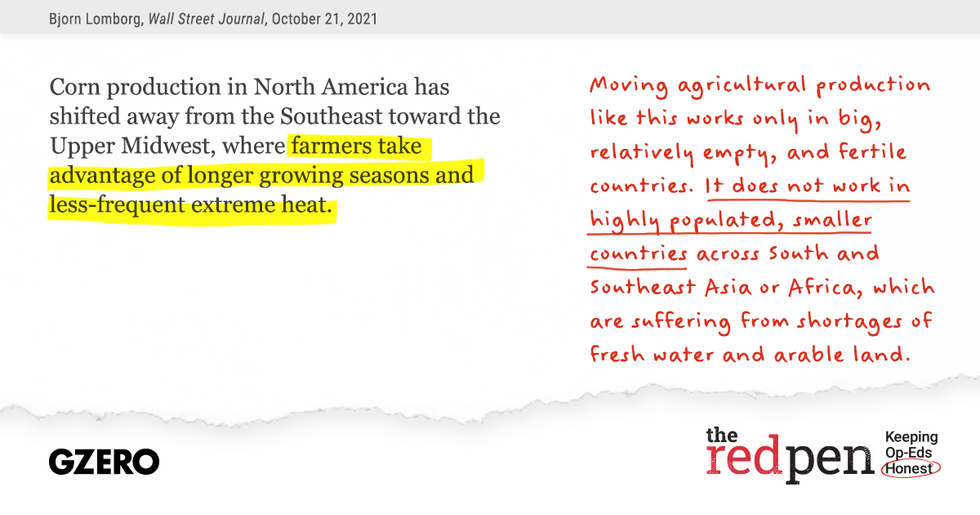
Third, Lomborg blames the media for pushing "unrealistic projections of climate catastrophes, while ignoring adaptation."
The media is an easy target. When it bleeds (or floods, or burns), it leads. (Except at GZERO, of course). And it's true that everyone is talking about how we've missed 1.5 degrees as a target, nobody mentions that the worst case scenarios of 5 and 6 are also now extremely unlikely—because of steps taken to mitigate emissions. But let's be honest: The people who are doing the real work on climate, and the governments and organizations putting lots of dollar signs behind it, are looking at the whole picture, including adaptation. And they've long since concluded that you can't adapt yourself out of climate change.
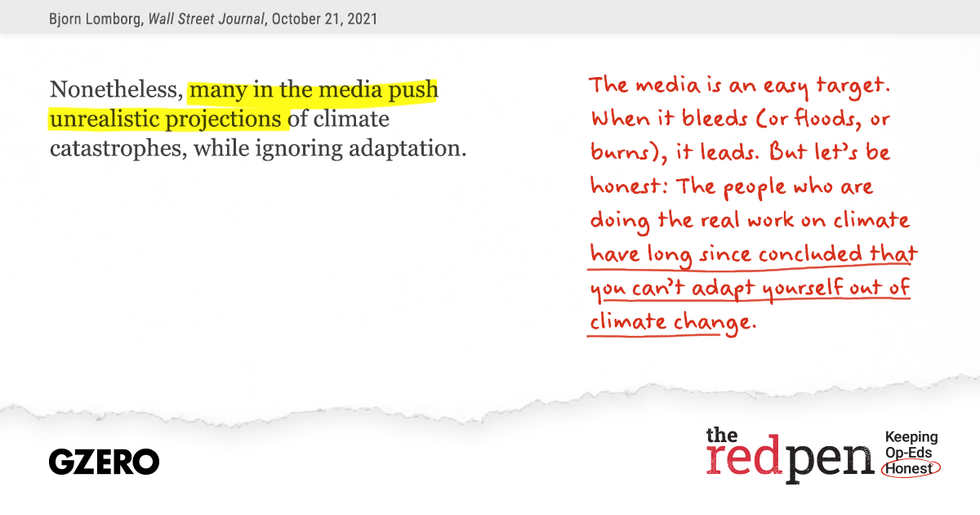
Lomborg also writes: "When sea levels rise, governments build defenses—like the levees, flood walls and drainage systems that protected New Orleans from much of Hurricane Ida's ferocity this year."
Levees and New Orleans are not usually in the same sentence...in a good way. But setting that aside, building flood walls and drainage systems works regionally, at best. It is no long term defense against rising sea levels, especially in densely populated regions like South and Southeast Asia, where millions of people live on the coasts.
The biggest problem here has been the mass destruction of coastal mangrove forests, which also acted as flood plains. Flood walls and drainage systems won't solve these problems.
Also, you can't build a levee to protect against forest fires, nor will they keep out climate migrants (build the levee sounds even worse than build the wall). And many developing country governments can't afford levees and other adaption at all.
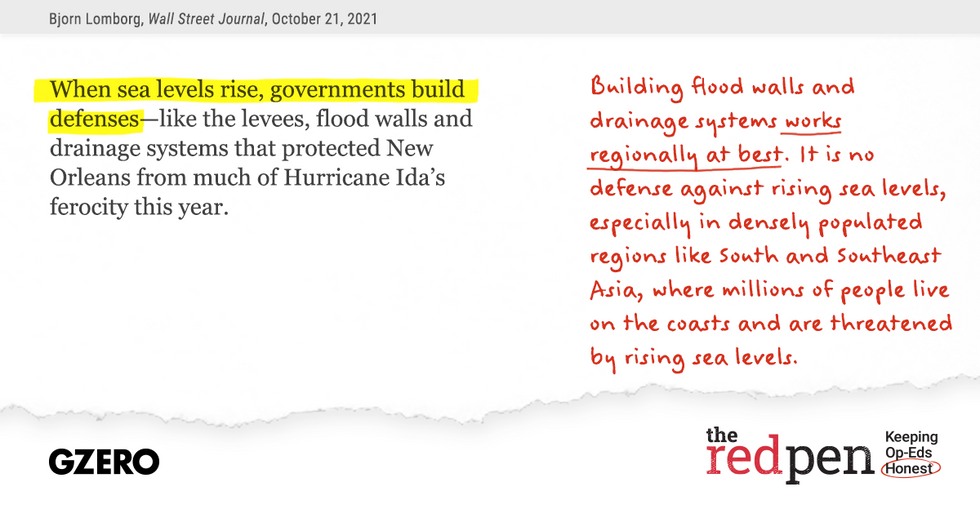
Finally, Lomborg concludes by arguing that "You don't have to portend doom to take climate change seriously. Ignoring the benefits of adaptation may make for better headlines, but it badly misinforms readers."
I agree with this conclusion – we don't need to warn people about a future doom to take climate change seriously. They're seeing it in their lives every single day, whether historically large fires in California or deadly floods in Germany or huge heatwaves in Bangladesh, India, and Pakistan. You know the other thing they're seeing? In a G-Zero world, no one is in charge, and governments and corporations are all moving in different directions, undermining pathways to a solution. That fact may end up scarier than anything Lomborg accuses the media of scheming up.
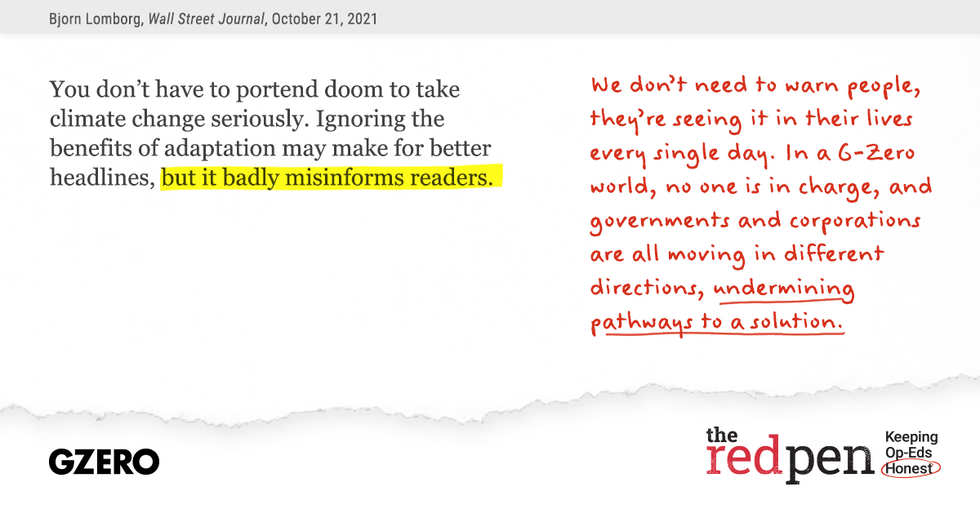
There you have it, that's your Red Pen for this week.




